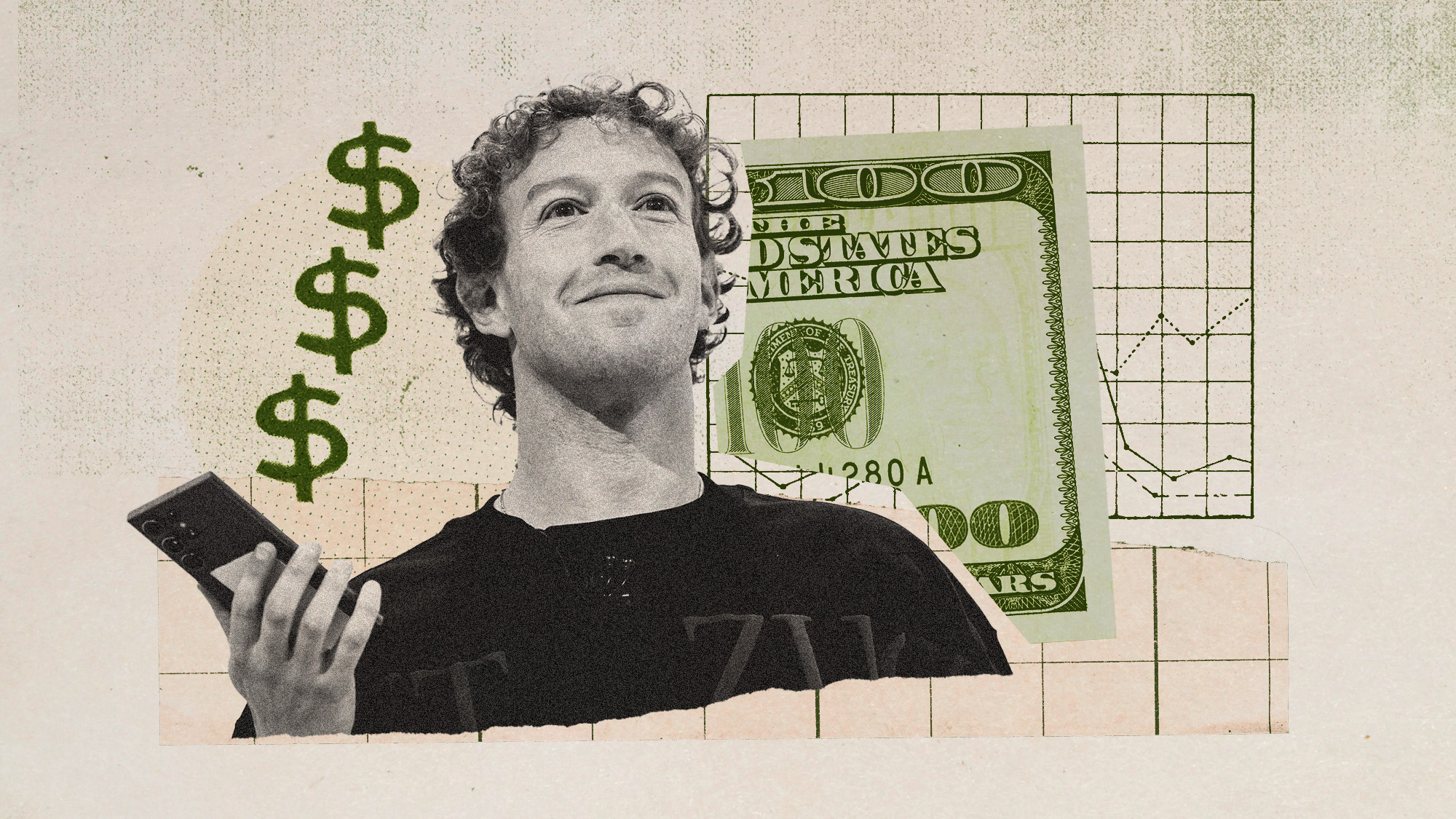How Facebook's metaverse could change your life


A free daily email with the biggest news stories of the day – and the best features from TheWeek.com
You are now subscribed
Your newsletter sign-up was successful
Twenty-five years ago, the internet was still a novelty accessed through a slow dial-up modem that tied up the landline phone you relied on for communication. Fifteen years ago, Facebook was just opening its social network to anyone 13 and older, and 10 years ago it was still a private tech startup on the verge of an IPO.
Now Facebook is one of the world's most valuable companies, with three of the biggest social media apps — Facebook, Instagram, and WhatsApp — used by billions of people, and one of the world's most controversial and socially disruptive businesses.
Facebook also has a new name, Meta, and a new focus: the metaverse. So, what is the metaverse? Will it be, in 10 years, as important a part of your life as the internet and social media? And if it is, would that be a good thing?
The Week
Escape your echo chamber. Get the facts behind the news, plus analysis from multiple perspectives.

Sign up for The Week's Free Newsletters
From our morning news briefing to a weekly Good News Newsletter, get the best of The Week delivered directly to your inbox.
From our morning news briefing to a weekly Good News Newsletter, get the best of The Week delivered directly to your inbox.
What is the metaverse?
The metaverse is an immersive internet experience that lets you replace or augment reality with computerized simulations that strive to be as realistic as possible. "Essentially, it's a world of endless, interconnected virtual communities where people can meet, work, and play, using virtual reality headsets, augmented reality glasses, smartphone apps, or other devices," The Associated Press reports. They can also shop.
Meta describes the metaverse as "the next evolution of social connection," 3D spaces were you can "socialize, learn, collaborate and play in ways that go beyond what we can imagine." CEO Mark Zuckerberg showed off some examples in his two-hour presentation to unveil the Meta rebrand and Facebook's new focus, which CNET has sliced down to 10 minutes.

Did Facebook invent the metaverse?
A free daily email with the biggest news stories of the day – and the best features from TheWeek.com
No, the name is attributed to Neal Stephenson's 1992 science fiction classic Snow Crash, but the idea is even older. Stephenson's "vision of the metaverse owed a debt to Vernor Vinge's 1981 True Names and to a series of William Gibson novels from the '80s," Amherst professor Ethan Zuckerman, who created his own kludgy metaverse in 1995, writes in The Atlantic. "Both of those authors owed a debt to Morton Heilig's 1962 Sensorama machine, and on and on we go, back in time to Plato's shadows on a cave wall."
The first virtual reality (VR) headset was created at MIT in 1968, and the technology progressed in fits and starts until a company called Oculus made a big leap forward in 2011. Now all the big tech companies — Google, Microsoft, Apple, plus major gaming platforms — are involved. Wall Street sees metaverse hardware and software as a $1 trillion market.
When did Facebook get involved?
Facebook bought Oculus in 2014 for $2 billion. At that time, Zuckerberg predicted that Facebook would become a metaverse company where people could share "not just moments with your friends online, but entire experiences and adventures."
So this isn't just an attempt to distract everyone from Facebook's litany of scandals?
Not entirely. But Facebook critics say the timing isn't coincidental. "If you don't like the conversation, you try to change the conversation," Frances Haugen, a Facebook product manager who turned prominent whistleblower, tells AP. Haugen's purloined documents formed the backbone of damning new revelations in the Facebook Papers.
What will we do in the metaverse?
Currently, Zuckerberg says, Meta is focusing on creating virtual office spaces where people working from home can gather as if in person, plus virtual homes people can design and host real friends for metaverse games. You will also be able to attend concerts, travel to distant cities and natural wonders, and, of course, shop for virtual clothes and goods that will exist in our virtual worlds. Theoretically, once the technology is good enough, the possibilities are as broad as our imaginations.
"It will make our world feel like Harry Potter," Louis Rosenberg, CEO of Unanimous AI and a veteran augmented reality (AR) developer, tells Insider. Magic is fun, but just like the Wizarding World, there is a dark side. "Instead of us just kind of being in our own information bubbles, we're going to be segmented into our own custom realities," Rosenberg said.
That's a bad thing?
Well, the metaverse, as envisioned in Snow Crash, "was a thing that people used to numb themselves when their lives were horrible" in Stephenson's dystopia, Haugen told AP. "So beyond the fact that these immersive environments are extremely addictive and they encourage people to unplug from the reality we actually live," she added, "I'm also worried about it on the level of — the metaverse will require us to put many, many more sensors in our homes and our workplaces," opening people to much more data harvesting.
"Folks should be worried," Shawn Frayne, CEO of holographic tech startup Looking Glass Factory, tells Insider. "If you think Facebook on your phone has been bad for democracy, think about your entire field of view controlled by a company like that." Allowing people to literally walk through the world in a reality curated by Facebook and the people it sells your data to would open dangerous new vectors of misinformation and silo people even further in their ideological bunkers, experts told Insider.
Will people trust Facebook with their virtual lives? Even more?
Zuckerberg is making a big bet that people will consider the downsides worth the draw of the metaverse, and he could be right. Maybe it will even help Meta retain some of the younger users it is losing to Snapchat and other competitors. But Haugen and others are worried. "If your employer decides they're now a metaverse company, you have to give out way more personal data to a company that's demonstrated that it lies whenever it is in its best interests," she told AP.
"Zuckerberg isn't building the metaverse because he has a remarkable new vision of how things could be," Zuckerman writes at The Atlantic. Half an hour into his Meta video, he talks about how humbling the last few years have been for him and Facebook, but "he's not humbled by the problem of Russian disinformation, or the spread of anti-vax misinformation, or the challenge of how Instagram affects teen body image. No, he's humbled by how hard it is to fight against Apple and Google. Faced with the question of whether Facebook's core products are eroding the foundations of a democratic society, Zuckerberg takes on a more pressing problem: Apple's 30 percent cut on digital goods sold in its App Store."
Will the metaverse be expensive?
If you are not paying for a product, the tech axiom goes, you are the product.
When the internet was first shifting from novelty to central aspect of our modern lives, lots of smart people wondered how anyone would make money if everything is free? Some industries, like journalism and recorded music, are still trying to figure that out. Companies like Google and then Facebook have figured out how to become ludicrously wealthy by offering services that people want to use, the only cost being huge amounts of personal data they collect about you and sell to people who want to convince you to buy their products, fealty, or way of seeing the world.
"Ads are going to continue being an important part of the strategy across the social media parts of what we do, and it will probably be a meaningful part of the metaverse, too," Zuckerberg confirmed on Facebook's most recent earnings call.
We're still going to use the metaverse, aren't we?
"The metaverse is real and Wall Street is looking for winners," Wedbush analyst Dan Ives wrote in a note, CBS News reports. Meta, because of its enormous resources and ownership of Oculus, will likely be one of the winners, but it won't be the only one. The goal of the metaverse developers is to create an infrastructure, like the internet, where people can seamlessly bounce from one virtual reality to the next.
And while Meta is trying to draw consumers into the metaverse with the promise of making their fantasies come (virtually) true, other companies, like Microsoft and Magic Leap, are more quietly focusing their AR efforts on industrial applications like design, manufacturing, and advertising.
When will the metaverse hit the mainstream?
Virtual reality has been the next big thing for many, many years. And the safest prognosis is that we are much closer than we were in the early 1990s.
That said, "let's be frank about this: Facebook's metaverse sucks," with stale, recycled ideas rendered in mediocre graphics, Zuckerman says. "The metaverse Zuckerberg shows off in his video doesn't have to solve those problems. He's promising future technologies that are five to 10 years off." But the larger challenge for Zuckerberg and other metaverse creators is that "the metaverse isn't about building perfect virtual escape hatches — it's about holding a mirror to our own broken, shared world," he argues. "Facebook's promised metaverse is about distracting us from the world it's helped break."
Still, it could be fun.
Peter has worked as a news and culture writer and editor at The Week since the site's launch in 2008. He covers politics, world affairs, religion and cultural currents. His journalism career began as a copy editor at a financial newswire and has included editorial positions at The New York Times Magazine, Facts on File, and Oregon State University.
-
 The best music tours to book in 2026
The best music tours to book in 2026The Week Recommends Must-see live shows to catch this year from Lily Allen to Florence + The Machine
-
 Gisèle Pelicot’s ‘extraordinarily courageous’ memoir is a ‘compelling’ read
Gisèle Pelicot’s ‘extraordinarily courageous’ memoir is a ‘compelling’ readIn the Spotlight A Hymn to Life is a ‘riveting’ account of Pelicot’s ordeal and a ‘rousing feminist manifesto’
-
 The EU’s war on fast fashion
The EU’s war on fast fashionIn the Spotlight Bloc launches investigation into Shein over sale of weapons and ‘childlike’ sex dolls, alongside efforts to tax e-commerce giants and combat textile waste
-
 Is social media over?
Is social media over?Today’s Big Question We may look back on 2025 as the moment social media jumped the shark
-
 Social media: How 'content' replaced friendship
Social media: How 'content' replaced friendshipFeature Facebook has shifted from connecting with friends to competing with entertainment companies
-
 Meta on trial: What will become of Mark Zuckerberg's social media empire?
Meta on trial: What will become of Mark Zuckerberg's social media empire?Today's Big Question Despite the CEO's attempt to ingratiate himself with Trump, Meta is on trial, accused by the U.S. government of breaking antitrust law
-
 What does an ex-executive's new memoir reveal about Meta's free speech pivot?
What does an ex-executive's new memoir reveal about Meta's free speech pivot?Today's Big Question 'Careless People' says Facebook was ready to do China censorship
-
 What's Mark Zuckerberg's net worth?
What's Mark Zuckerberg's net worth?In Depth The Meta magnate's products are a part of billions of lives
-
 Is the AI bubble deflating?
Is the AI bubble deflating?Today's Big Question Growing skepticism and high costs prompt reconsideration
-
 How social media is limiting political content
How social media is limiting political contentThe Explainer Critics say Meta's 'extraordinary move' to have less politics in users' feeds could be 'actively muzzling civic action'
-
 Twitter's year of Elon Musk: what happens next?
Twitter's year of Elon Musk: what happens next?In the Spotlight 'Your platform is dying', says one commentator, but new CEO is aiming for profitability next year
